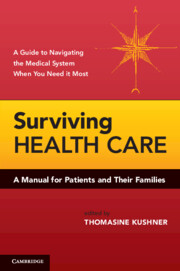Book contents
- Frontmatter
- Contents
- Contributors
- Preface
- 1 Letter to Patients
- 2 Becoming an Active Member of Your Health Care Team
- 3 Information That Will Help You with Advance Planning for Your Health Care
- 4 Responding to Medical Emergencies
- 5 What You Need to Know about Medical Errors
- 6 Being Informed When You Give Consent to Medical Care
- 7 Beware of Scorecards
- 8 Transplantation 101
- 9 When the Illness Is Psychiatric
- 10 On the Horizon
- 11 To Be or Not to Be – A Research Subject
- 12 Information That Will Help You Make Health Care Decisions for Adult Family Members
- 13 Caring for Individuals with Alzheimer's Disease
- 14 When the Patient Is a Child
- 15 Care of Elders
- 16 Being and Thinking
- 17 A Patient's Guide to Pain Management
- 18 The Hardest Decisions
- 19 What You Need to Know about Disasters
- 20 Making the Internet Work for You
- Appendix: Patient Individual Profile
- Index
- References
14 - When the Patient Is a Child
Published online by Cambridge University Press: 05 June 2012
- Frontmatter
- Contents
- Contributors
- Preface
- 1 Letter to Patients
- 2 Becoming an Active Member of Your Health Care Team
- 3 Information That Will Help You with Advance Planning for Your Health Care
- 4 Responding to Medical Emergencies
- 5 What You Need to Know about Medical Errors
- 6 Being Informed When You Give Consent to Medical Care
- 7 Beware of Scorecards
- 8 Transplantation 101
- 9 When the Illness Is Psychiatric
- 10 On the Horizon
- 11 To Be or Not to Be – A Research Subject
- 12 Information That Will Help You Make Health Care Decisions for Adult Family Members
- 13 Caring for Individuals with Alzheimer's Disease
- 14 When the Patient Is a Child
- 15 Care of Elders
- 16 Being and Thinking
- 17 A Patient's Guide to Pain Management
- 18 The Hardest Decisions
- 19 What You Need to Know about Disasters
- 20 Making the Internet Work for You
- Appendix: Patient Individual Profile
- Index
- References
Summary
As we train to become pediatricians, one of the first things we learn is that children are not small adults. Those who care for young patients should heed this lesson each day. If you are a parent, this concept may seem obvious, but it nonetheless is helpful to remember how important it is, because when your child is ill, you are your child's best advocate. The illness that brings your child to the hospital may be unique to children, or it may be something that can afflict people of any age. One difference is that most adults are capable of understanding their illness, making decisions about their own care, and understanding what is happening to them. Newborn babies and young children are entirely dependent on others for their care and well-being. As they grow older, they begin to acquire a sense of the world around them; they develop an ego or self-awareness and can gradually understand more complex ideas (e.g., what causes illness and how the illness affects them personally).
Decision Making for Children
A patient's competence is one of the most important factors in making informed decisions. It represents his or her ability to understand the situation and possible outcomes and to consider the consequences of each choice he or she makes. In addition, a patient must be able to take this information, put it in the context of his or her values and goals, and then make a voluntary decision.
- Type
- Chapter
- Information
- Surviving Health CareA Manual for Patients and Their Families, pp. 191 - 205Publisher: Cambridge University PressPrint publication year: 2010

